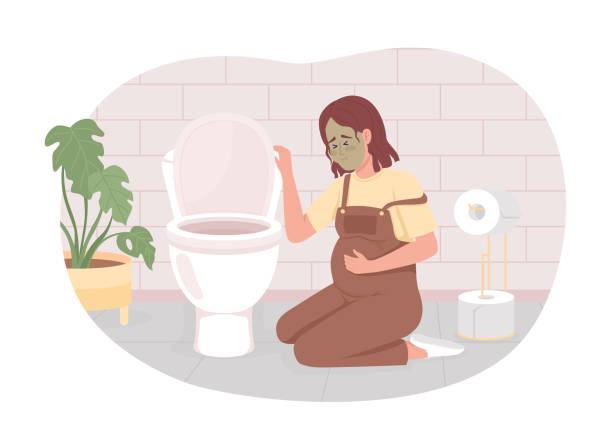Morning sickness is a typical and frequently upsetting pregnancy symptom. It can lead to extreme nausea, vomiting, and tiredness in a lot of women. There are numerous ways to get relief if you’re one of the many ladies who experience morning sickness. This blog post will go over 12 of the best strategies for dealing with morning sickness so you can feel more like yourself again.
1) Drink lots of fluids

Staying hydrated can help you find relief from morning sickness. It is important to drink plenty of fluids, such as water, clear broths, and sports drinks. If you are unable to keep down water, try adding fresh lemon or lime juice for flavour. Avoid sugary drinks as they can increase nausea.
Also, be sure to sip fluids slowly throughout the day instead of drinking large amounts at once. Drinking large amounts at once can cause further nausea. Additionally, avoiding hot beverages can also reduce symptoms of morning sickness.
2) Eat small frequent meals

Eating small, frequent meals is one of the best methods to combat morning sickness. Smaller meals can prevent overeating and lower the possibility of motion sickness. Additionally, it supports steady blood sugar levels, which might lessen nausea.
Throughout the day, try to eat every two to three hours, beginning with a light meal soon after waking up. Try to eat a snack between meals, such as crackers, yoghurt, or nuts. Avoid fatty or heavy foods since they can worsen nausea.
Try eating bland, readily digested items like dry toast, crackers, and clear soups if you’re having difficulties keeping food down. You may also want to try sipping on fluids, such as water or ginger ale, throughout the day. Avoiding overly sweet and spicy foods may also help reduce nausea.
If you’re having trouble keeping anything down at all, talk to your doctor about other options for getting the nutrition you need.
3) Avoid strong odours

One of the most common ways to find relief from morning sickness is to avoid strong odours. Strong smells like certain foods, perfumes, and other smells can trigger nausea. Even if you don’t think the smell is strong, it can still be enough to cause you to become nauseous.
If you’re at home or in public and you come across a smell that bothers you, try to move away from it as soon as possible. If it’s something you can’t avoid, like a perfume someone is wearing, try using a scented handkerchief to cover your nose and mouth. It might help to carry a portable fan to help disperse the scent. Also, try to keep your windows open in your home and car and use an air freshener or scented candle if needed.
4) Get plenty of rest

Sleeping is one of the greatest methods to deal with morning sickness. Your body requires more energy and recovery time while you are pregnant so, you must get enough sleep because it can lessen your nausea. You can also try to take a few quick naps throughout the day if you’re feeling particularly queasy.
Additionally, you should work to reduce your stress levels because they might make morning sickness worse. For feeling energised and relieving stress, engage in activities like exercise, meditation, and relaxation techniques.
5) Try ginger

One of the most well-liked all-natural treatments for morning sickness is ginger. For millennia, it has been used to lessen nausea and vomiting. Ginger includes gingerols, which are thought to be the key ingredients behind ginger’s anti-nausea properties.
According to studies, ginger can be effective in reducing morning sickness. According to one study, women who took ginger supplements had much less nausea and vomiting than those who did not. Another study revealed that ginger was just as helpful as vitamin B6 at easing morning sickness symptoms.
You can try drinking ginger tea or taking ginger capsules if you want to try utilizing ginger to aid with your morning sickness. If you choose to drink ginger tea, it’s best to make it with fresh, grated ginger root. You can also try adding freshly grated ginger to smoothies or soups. To get the most out of ginger, it’s best to take it on an empty stomach.
6) Try acupuncture

In order to stimulate the body’s energy flow, acupuncture is a traditional Chinese medicine that involves putting tiny needles into particular places on your body. Morning sickness is one of several illnesses that are treated with acupuncture. Acupuncture is thought to help balance hormones, which in turn can lessen nausea and vomiting.
According to one study, women who received acupuncture during their first trimester of pregnancy had much fewer instances of nausea and vomiting than the control group.
It’s crucial to locate a skilled and experienced practitioner if you decide to attempt acupuncture for morning sickness. A practitioner of acupuncture should be knowledgeable about the procedure and any hazards involved in administering it, and there shouldn’t be any discomfort. It’s also important to discuss the use of acupuncture with your healthcare provider before starting treatment. Acupuncture should not replace other conventional treatments such as medications or dietary changes.
7) Try acupressure

Acupressure is a popular form of alternative therapy that has been used to relieve symptoms associated with morning sickness, especially nausea. This ancient practice involves the use of pressure on specific areas of the body. It is believed that these specific points can stimulate energy flow and help to restore balance in the body. Acupressure can be done by yourself or with the help of a professional acupressurist.
When using acupressure for morning sickness, some common points to focus on include Neiguan (inner gate), Zhongwan (middle gate), Hegu (joining valley), Zusanli (leg three miles) and Baihui (hundred meetings). These pressure points are located on the hands, feet, head and chest. Applying gentle pressure to each point for several seconds can help to reduce nausea associated with morning sickness.
It is important to note that acupressure should not replace traditional medical treatments for morning sickness, but may be used as an adjunct therapy for the relief of symptoms. Be sure to consult with your healthcare provider before trying any type of alternative.
8)Try hypnosis

By encouraging relaxation and lowering stress and anxiety, which can worsen nausea and vomiting, hypnosis may help treat morning sickness. A person is led into hypnosis, a deep state of relaxation where they are very receptive to ideas. A hypnotist may offer suggestions during this trance to lessen nausea and enhance emotions of well-being. Although further research is required to prove its efficacy, some evidence suggests that hypnosis may be useful in lessening the symptoms of morning sickness. Before attempting hypnosis for morning sickness or any other disease, it’s always necessary to speak with a medical expert or a certified hypnotist.
Additionally, research suggests that medical hypnosis can be considered as an adjunctive treatment option for those women with hyperemesis gravidarum, which is a severe and debilitating form of morning sickness.
9) Try aromatherapy

Aromatherapy is a form of alternative medicine that uses essential oils from plants to promote healing and well-being. Aromatherapy can be used in several ways, including inhalation and topical application.
Inhalation of essential oils can be done through diffusers, humidifiers, or directly from the bottle. This is believed to help with morning sickness by promoting relaxation and reducing stress and anxiety, which can contribute to nausea and vomiting. Peppermint, ginger, lemon and spearmint are some of the oils that are considered to be helpful.
Topical application of essential oils can be done by mixing a few drops of the oil with a carrier oil, such as coconut or sweet almond oil, and then applying it to the skin. This can be helpful to reduce feelings of nausea and vomiting.
It’s important to keep in mind that essential oils are highly concentrated and should be used with caution, especially during pregnancy. It’s always best to consult with a qualified aromatherapist or healthcare professional before using essential oils during pregnancy.
10) Try reflexology

Reflexology is a type of complementary therapy that includes pressing on particular reflex spots on the hands, feet, or ears. It is believed that each reflex point corresponds to a particular organ or body portion.
Reflexology’s usefulness in treating morning sickness during pregnancy hasn’t been well studied, but some evidence indicates that treatment might help to lessen nausea and vomiting.
Reflexology is a technique where a professional applies pressure to certain areas on the feet, hands, or ears that are thought to correspond to the digestive system. This can help with morning sickness symptoms.
It’s important to note that reflexology should only be performed by a trained and certified practitioner. Also, it’s always best to consult with a healthcare professional before trying reflexology, especially during pregnancy.
11) Try herbal teas

Teas made from herbs might be a healthy method to aid with morning sickness during pregnancy. Herbal teas that are thought to be beneficial include:
- Ginger tea: The anti-inflammatory and anti-nausea qualities of ginger are well recognized, and they may help to lessen the feeling of nausea and vomiting.
- Tea with peppermint leaves: Peppermint tea might aid in digestion and help with nausea symptoms.
- Lemon tea: Lemon has a high vitamin C content and may help to lessen nausea.
- Tea made from chamomile flowers: Chamomile flowers are known for their calming and sedative effects. They may also assist to lessen tension and anxiety, which can worsen morning sickness.
It’s important to note that it’s always best to consult with a healthcare professional before trying any new herbal tea during pregnancy, as some herbs may not be safe for use during pregnancy. Also, It’s important to be aware that some herbal teas might interact with any medication you might be taking.
12) Try vitamin B6

A water-soluble vitamin with the chemical name pyridoxine, vitamin B6 is essential for several vital biological processes. According to some research, vitamin B6 may be useful in easing morning sickness symptoms during pregnancy. However, in light of the nascency of this research, it is always advisable to get medical advice before using this or any other vitamin supplements, especially when pregnant.
Conclusion
In conclusion, finding relief from morning sickness can be a challenge during pregnancy, but with the right strategies in place, it’s possible to ease the discomfort and enjoy a healthy pregnancy journey. From drinking plenty of fluids, sipping on herbal teas, using aroma therapy, eating small frequent meals, and getting enough rest, to trying acupressure and acupuncture, there are many options available to help you find relief. Experiment with different techniques to find what works best for you and always consult your doctor before trying any new remedies. Remember to take good care of yourself and your body, and enjoy the journey of bringing new life into the world.

Akanksha Sharma
Dr. Akanksha Sharma, Head Writer and creator of AtoZ of Pregnancy, is dedicated to empowering women, parents, and families through 360-degree knowledge. She and her team provide evidence-based advice to guide families through pregnancy, parenting and beyond.






